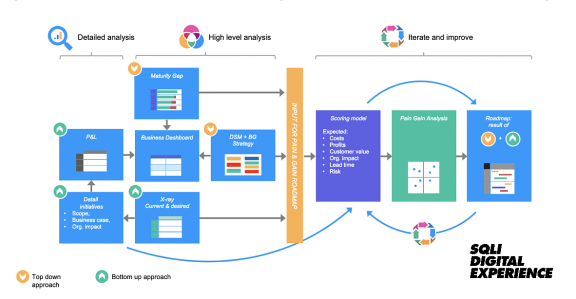
E-Commerce
The full guide on how to optimize your current E-commerce platform, implement a new one and continuously drive digital business growth.
INTRODUCTION
Being successful in E-commerce starts with a good product and the right people. To sell your products efficiently, you need a reliable platform, complete and correct product data, and an attractive and effective user experience design. To ensure you can successfully keep selling your products or services, both today and in the years to come, you need an E-commerce platform that's not just reliable, but also flexible, easy to adapt, and scalable.
Discover how E-commerce can support your experience-driven customer journey, through flawless transactions and meaningful interactions with your customers.
The Benefits of E-Commerce
For B2B organizations, E-commerce is not only a great way to boost revenue and drive customer acquisitions, but it is becoming a requirement for a future-proof business as more and more B2B customers also request more self-service.
There are many processes that can be improved with digital tools, either by automation, digital workflows, or by giving the customers more self-service tools. Working together with our own B2B customers, it’s apparent that self-service is becoming increasingly important. Sometimes even more important than the transactional part to, for example:
- Enable customers to create complex orders
- Offer rich product data available
- Streamline internal order and approval process.
Leading to increased customer satisfaction, reduced errors and reduced costs.
Another advantage of E-commerce is its capability to enhance and deepen your customer relations. This may sound somewhat contradictory, but there are two ways e-commerce accomplishes this:
- Freeing up human resources with reduced administrative tasks
- Digital communication and collaboration to deepen the relationship with your customers, as it becomes more regular.
For B2C, the importance and benefits of maintaining a proper E-commerce channel for successful B2C commerce should need no further explanation. But is your E-business solution also capable of supporting all your business requirements efficiently? In this case, data can be the unlocking key of differentiating and even competitive advantage opportunities.
Read more on how to truly benefit from an E-commerce Platform ➔
E-Commerce Digital Strategy
How to develop a Digital Strategy for E-Commerce
If you’re in the process of establishing the main drivers for your e-commerce or digital strategy, start by asking what’s most important to you to start with, for example, customers, internal processes or budget. The answer will help you determine what to prioritise, which improvements deliver the most value, the order in which to execute new initiatives, or how to guarantee support for your decisions based on the business needs.
To help you, SQLI has created a process, which is based on a decision framework to enable you to make consistent and justifiable decisions. Input for the decision framework is collected both top-down, high level, and bottom-up, all through detailed analysis. This allows us to make a flying start based on high-level estimates, adding necessary detail along the way. A recurring process of detailing and adapting helps you stay agile and adapt, without losing consistency or support in your organization. In short, this framework to help you:
- Define and communicate what is most important and urgent for your business
- Quantify the needed resources and projected profits
- Create, and continuously update, a company-wide digital roadmap
Read more on how develop a Digital Strategy for E-commerce ➔
E-Commerce Platform
1. Solution Evaluation
Whether you’re a new business or have been around for years, digital growth is vital for your company’s success. That's why it's important to have an E-commerce solution that's future-proof, supports your growth ambitions, and continues to meet your customer's expectations.
The right E-commerce platform will improve your digital channels, enhance your customer experience, increase traffic, conversions, revenue, and customer retention, while at the same time lower costs.
The range of different E-commerce systems is growing, the market is fragmenting and thus becoming increasingly confusing: on the one hand, e-commerce systems are increasingly designed for specific markets, industries and technical environments; on the other hand, a trend towards greater flexibility and individualisation can be observed. This is making finding the right E-commerce solutions for your business an increasingly complex task. We recommend bringing in an experienced partner in the evaluation phase.
With our Solution Evaluation Workshop we give you the right expertise and know-how to guide during the process. Since we work with several partners, we know in detail the advantages and drawbacks of these solutions, we can give you objective advice. This workshop is thought to just help you select the right solution, so you can get to the next step towards implementation faster, no further commitment implied.
Book your E-commerce Solution Evaluation ➔
2. Implementation
E-commerce platforms are, by nature, deeply embedded in their organization. Making the right long-term functional and technical choices are vital if you want to successfully integrate, grow and sustain a future proof e-commerce business.
Implementing an effective E-commerce platform can be an expensive, time-consuming endeavour, and can easily drain IT and business resources. There are several steps to take if you plan on implementing a new E-commerce solution within your organization. These are some of the topics to consider:
- E-commerce implementation strategy & goals: When is your e-commerce implementation successful?
- Vision and analysis of the complete solution. What’s the current and future state of your architecture, data, processes and application landscape
- E-commerce implementation plan: can you reserve sufficient time from your most knowledgeable people?
- E-commerce implementation and migration strategy.
- Final checklist before Go Live
Read more on how to integrate an E-commerce platform into your business➔
3. Optimization
Continuously optimizating your E-commerce is key to guarantee its future-proof, long-term success. While new solutions, features and trends flood the market with big promises of customer loyalty, reduced cart-abandonment and increased personalization improvement might sound tempting. Going back to the basics should come first when facing and analysing the marketing hypes, new and exciting tools and technologies, and ever-growing customer demands. Focus on creating growth by increasing revenue, reducing cost, and optimizing your customer experience. Some of our suggestions, further explained in the dedicated page, are:
- Increase the revenue from your current E-commerce platform using the SEE THINK DO CARE model by Google.
- Reduce costs with your E-commerce platform. This includes savings on customer onboarding, product onboarding and customer service.
- Optimize customers interactions through deeper integration of your channels and touchpoints. This opens up a wide range of opportunities to better serve and connect with your customers, ultimately driving growth.
Read more on how to optimize your current E-commerce solution ➔
Start optimizing your e-commerce solution now
With our audit workshop, we will together assess the current weaknesses, strengths and growth opportunities of your current E-commerce platform. This audit workshop will deliver actionable insights, a fresh perspective and key next-steps to enable your own
E-commerce growth in the short and long-term.
How to find the right E-commerce solution
A strong, future-proof E-commerce solution is necessary to effectively support your digital business goals. But, which platform, technology stack, and architecture is the right one? Find out the strengths and weaknesses of available E-commerce solutions, and how their different functionalities and architectures can support your Digital Strategy.
How to make your E-commerce profitable
What is the difference between E-commerce application and platform? An E-commerce platform can ensure, on the one hand, side flexibility and scalability but also provide the capabilities needed to accelerate growth. Will an E-commerce platform make your E-commerce efficient and profitable?
THE RIGHT PARTNER
What you should look for in an E-commerce partner
E-commerce offers great opportunities, while at the same time challenging the capabilities of any existing organization. That's why most large organizations in B2B and B2C look for an experienced partner and advisor when embarking on their digital journey, to support them in successfully adopting and implementing e-commerce strategies. A professional partner should not only support you in selling products online efficiently, but also help you with objective advice, and implementing a future-proof and reliable digital platform. One that delivers a complete and relevant buying experience, through attractive and effective experience design. Find out what you should look for in an E-commerce partner.
Our Expertise
A full-service digital agency with more than 30 years of experience in E-commerce. Digital Strategy, technology selection, implementation, design & success measurement to help you grow your digital revenue stream. We have helped companies like these with their E-commerce challenges.
Curious to learn more?
Get in touch to discuss how we can support you to drive e-commerce success.
Contact us



